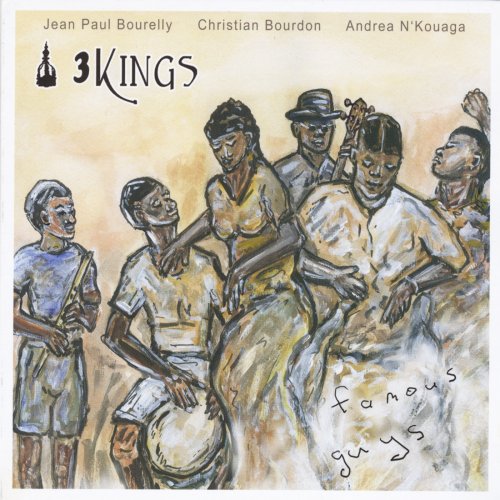Karita Mattila - German Romantic Arias (2002)
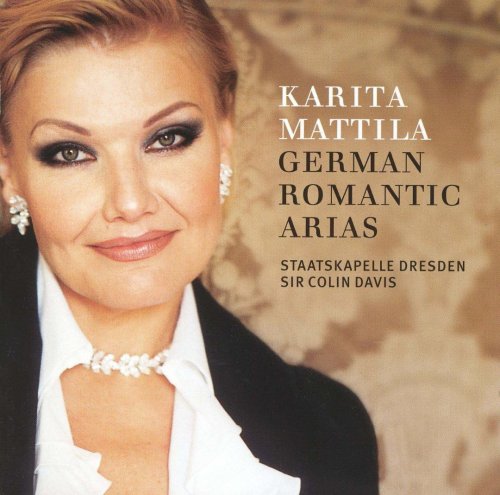
Artist: Karita Mattila
Title: German Romantic Arias
Year Of Release: 2002
Label: Erato Disques
Genre: Classical
Quality: FLAC (image + .cue, log, artwork)
Total Time: 01:02:10
Total Size: 255 MB
WebSite: Album Preview
Tracklist:Title: German Romantic Arias
Year Of Release: 2002
Label: Erato Disques
Genre: Classical
Quality: FLAC (image + .cue, log, artwork)
Total Time: 01:02:10
Total Size: 255 MB
WebSite: Album Preview
Ludwig van Beethoven
1. Abscheulicher, Wo Eilst Du Hin?
2. Ah! Perfido Op. 65
Carl Maria von Weber
3. Wie Nahte Mir Der Schlummer/Leise, Leise, Fromme Weise (Der Freischutz)
4. Und Ob Die Wolke Sie Verhulle (Der Freishcutz)
5. Ocean! Thou Mighty Monster (Oberon)
6. Schirmende Engelschar (Euryanthe)
7. So Bin Ich Nun Verlassen (Euryanthe)
Felix Mendelssohn-Bartholdy
8. Infelice! Op. 94
Performers:
Soprano Vocals – Karita Mattila
Orchestra – Staatskapelle Dresden
Conductor – Sir Colin Davis
In the 1990s, the Finnish soprano Karita Mattila established herself as one of the world's leading operatic sopranos. Coming to early attention as a prize-winning singer adept at the more lyric roles in the repertory, she developed the qualities of a dramatic soprano as well, with an especially warm and grand voice. She is a tall, blond, and striking woman with excellent stage presence and acting skills.
She studied voice at the Sibelius Academy in Helsinki. While still a student, she won one the first prize of the Lappeenranta Competition in 1981. This led to her professional debut at the Savonlinna Opera Festival, where she sang Donna Anna in Mozart's Don Giovanni. In 1983, she became the first Cardiff Singer of the World.
She was now ready to enter the international opera world. Once again she debuted in one of the great Mozart roles: Countess Almaviva in Le nozze di Figaro at La Monnaie Opera in Brussels. While not exclusively singing Mozart, she became best known for her work in his operas. She chose Donna Elvira (another role in Don Giovanni) for her British and American debuts in 1985; these were at the Scottish Opera and Washington, D.C. Opera, respectively. She made her Covent Garden and Paris debuts the next year as Fiordiligi in Così fan tutte, and also added Pamina and Ilia to her operatic repertory.
She continued to make international appearances, but found that her career was leveling out in the early 1990s. She went into a period of introspection and she came to the realization that full vocal maturity was leading her into a different quality. She took the time needed to restudy and retrain it for its new, rich, and weighty quality.
After that, she re-emerged with a striking new capacity to sing roles such as Eva in Die Meistersinger and Chrysothemis in Richard Strauss' Elektra. She sang the Wagnerian role of Elsa in Lohengrin in her debut at San Francisco in 1996. But the role in which she had her greatest triumphs was that of Elisabeth of Valois in Verdi's Don Carlos, a level of acclaim that has since been matched by her stunning appearance as Janacek's Jenufa at the Hamburg Opera in 1998. She has proven especially effective in Slavonic operas; in addition to Jenufa she is noted for her performances as both of Tchaikovsky's greatest heroines, Tatyana in Eugene Onegin and Lisa in Pikovaya Dama (Queen of Spades), which she sang at the Metropolitan Opera in 1995.
Other roles she has sung are Emma in Schubert's Fierrabras, Musetta in La bohème, Puccini's Manon Lescaut, and Amelia in Verdi's Simon Boccanegra. In 2000, her first performance as Leonora in Beethoven's Fidelio (Metropolitan Opera with James Levine conducting) won accolades.
When she appears in lieder recitals, she regularly receives great acclaim, especially in Sibelius songs. Her stage presence allows her to appear effectively in the increasingly popular large-scale outdoor arena events, where she is not hesitant to use electronic amplification.
She holds her performances down to between 45 and 60 performances a year, believing that this represents for her the right mixture of work and rest to keep her voice in good shape. This means that she has come to restrict her performances to leading music venues like New York, Paris, London, and Salzburg. "Not the crappiest places in the world, are they?" she laughs.
Karita Mattila was an active recording artist, with releases on the Philips, Ondine, Bis, and EMI labels, and has recorded popular songs as well as classical and operatic selections. -- Joseph Stevenson
She studied voice at the Sibelius Academy in Helsinki. While still a student, she won one the first prize of the Lappeenranta Competition in 1981. This led to her professional debut at the Savonlinna Opera Festival, where she sang Donna Anna in Mozart's Don Giovanni. In 1983, she became the first Cardiff Singer of the World.
She was now ready to enter the international opera world. Once again she debuted in one of the great Mozart roles: Countess Almaviva in Le nozze di Figaro at La Monnaie Opera in Brussels. While not exclusively singing Mozart, she became best known for her work in his operas. She chose Donna Elvira (another role in Don Giovanni) for her British and American debuts in 1985; these were at the Scottish Opera and Washington, D.C. Opera, respectively. She made her Covent Garden and Paris debuts the next year as Fiordiligi in Così fan tutte, and also added Pamina and Ilia to her operatic repertory.
She continued to make international appearances, but found that her career was leveling out in the early 1990s. She went into a period of introspection and she came to the realization that full vocal maturity was leading her into a different quality. She took the time needed to restudy and retrain it for its new, rich, and weighty quality.
After that, she re-emerged with a striking new capacity to sing roles such as Eva in Die Meistersinger and Chrysothemis in Richard Strauss' Elektra. She sang the Wagnerian role of Elsa in Lohengrin in her debut at San Francisco in 1996. But the role in which she had her greatest triumphs was that of Elisabeth of Valois in Verdi's Don Carlos, a level of acclaim that has since been matched by her stunning appearance as Janacek's Jenufa at the Hamburg Opera in 1998. She has proven especially effective in Slavonic operas; in addition to Jenufa she is noted for her performances as both of Tchaikovsky's greatest heroines, Tatyana in Eugene Onegin and Lisa in Pikovaya Dama (Queen of Spades), which she sang at the Metropolitan Opera in 1995.
Other roles she has sung are Emma in Schubert's Fierrabras, Musetta in La bohème, Puccini's Manon Lescaut, and Amelia in Verdi's Simon Boccanegra. In 2000, her first performance as Leonora in Beethoven's Fidelio (Metropolitan Opera with James Levine conducting) won accolades.
When she appears in lieder recitals, she regularly receives great acclaim, especially in Sibelius songs. Her stage presence allows her to appear effectively in the increasingly popular large-scale outdoor arena events, where she is not hesitant to use electronic amplification.
She holds her performances down to between 45 and 60 performances a year, believing that this represents for her the right mixture of work and rest to keep her voice in good shape. This means that she has come to restrict her performances to leading music venues like New York, Paris, London, and Salzburg. "Not the crappiest places in the world, are they?" she laughs.
Karita Mattila was an active recording artist, with releases on the Philips, Ondine, Bis, and EMI labels, and has recorded popular songs as well as classical and operatic selections. -- Joseph Stevenson
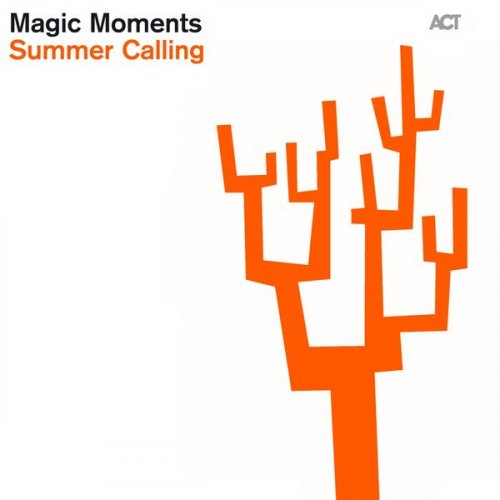
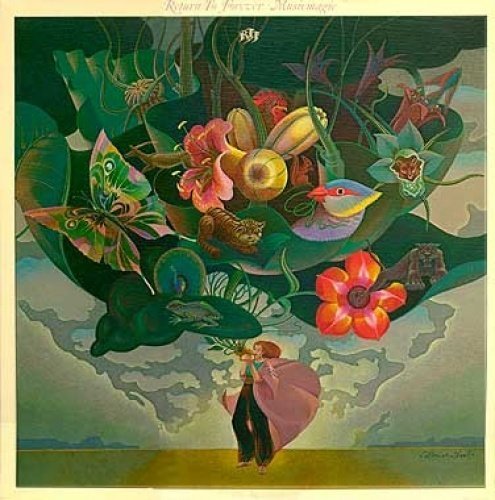
![Art Pepper - Everything Happens To Me: 1959 - Live At The Cellar (2026) [Hi-Res] Art Pepper - Everything Happens To Me: 1959 - Live At The Cellar (2026) [Hi-Res]](https://www.dibpic.com/uploads/posts/2026-02/1771405170_fcwg7jmt6mou1_600.jpg)
![Mantovani & His Orchestra - The Greatest Gift Is Love (1975/2026) [Hi-Res] Mantovani & His Orchestra - The Greatest Gift Is Love (1975/2026) [Hi-Res]](https://www.dibpic.com/uploads/posts/2026-02/1771524770_cover.jpg)

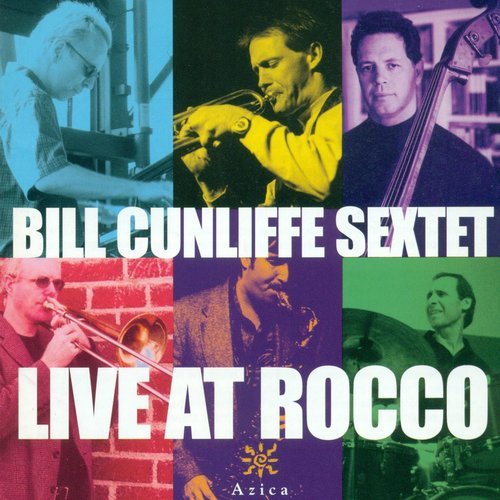

![Youn Sun Nah - Lost Pieces (2026) [Hi-Res] Youn Sun Nah - Lost Pieces (2026) [Hi-Res]](https://www.dibpic.com/uploads/posts/2026-02/1771413579_1.jpg)
